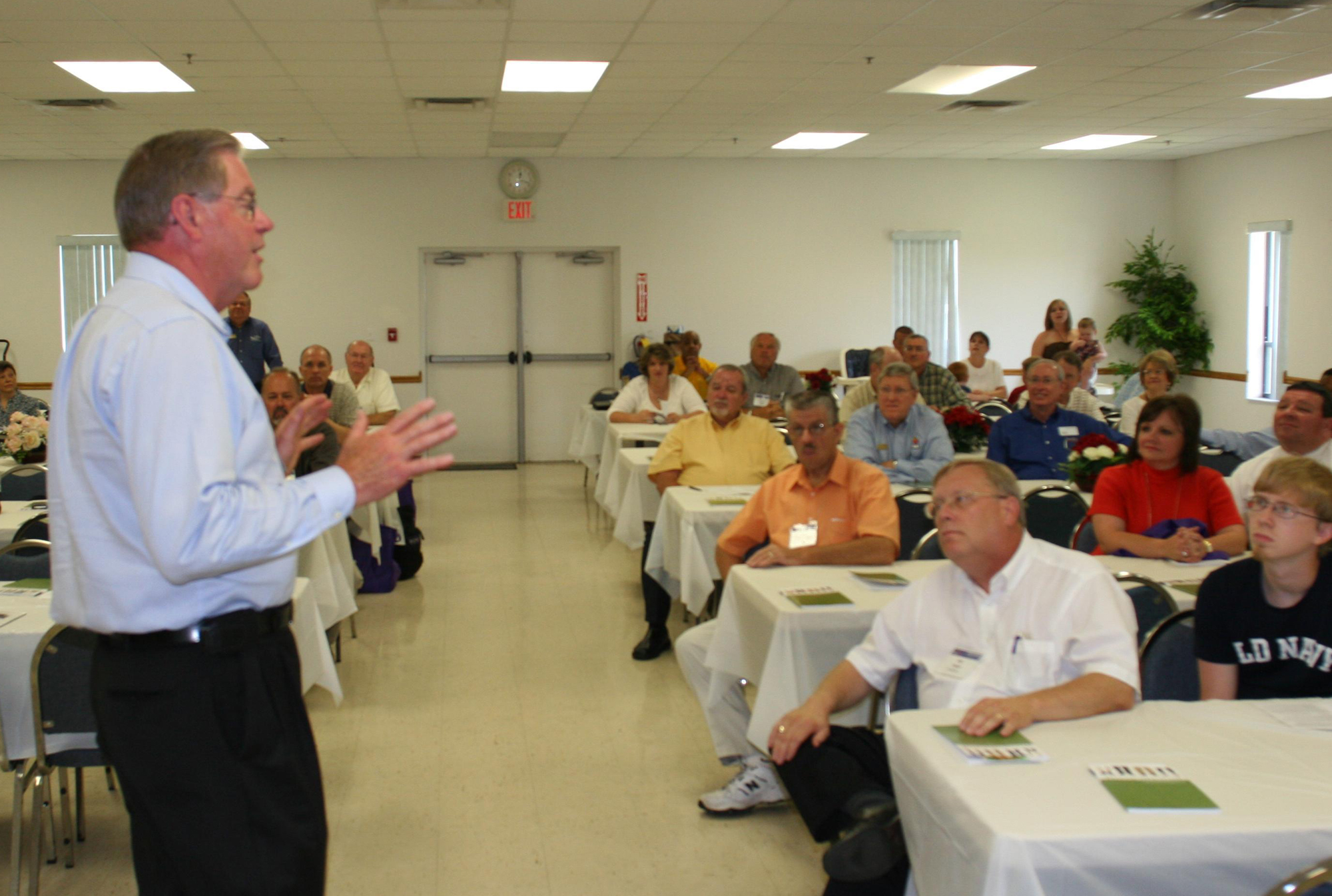
ORLANDO, Fla. (BP)–From Nevada to New York and many states in between, 75 Southern Baptist bivocational pastors attended the inaugural luncheon of the newly named Bivocational and Small Church Leadership Network during the Southern Baptist Convention’s annual meeting in Orlando, Fla.
“Being a bivocational pastor does not mean you’re a little preacher or part-time preacher,” said Ray Gilder, the network’s national coordinator and bivocational ministry leader for the Tennessee Baptist Convention. “You may be getting part-time pay but you are the full-time pastor of your church.”
Gilder is bivocational himself as pastor of the 200-member Gath Baptist Church in McMinnville, Tenn.
“Most pastors in Southern Baptist life are familiar with bivocational ministry,” said Gilder, noting that an estimated 75 percent of all SBC churches run less than 100 people in Sunday School. About half of the convention’s 45,000 churches are small and bivocational — not only rural traditional churches with steeples, but also cowboy churches, house churches and churches in multi-housing communities.
Never apologize for being bivocational, Gilder told attendees at the network’s June 15 luncheon. “There’s nothing wrong with being a small church. Just be what God wants you to be where you are.”
Noting that the Apostle Paul was a bivocational preacher, Gilder said, “He made tents for a living but he was also a pretty fair preacher,” one who “never had to apologize for being bivocational.”
Attendee Jim Blevins, 49, said he is enthusiastic about the new Bivocational and Small Church Leadership Network. “I just wish it had been there when I started as a bivo pastor 20 years ago.”
Blevins is the bivocational pastor of tiny Chadwell Station Baptist Church in Ewing, Va., founded in 1785, and director of engineering for a nearby industrial firm.
He described his church as “the most supportive church I’ve ever been associated with. They know my job requires me to travel a lot. They’re always asking me if I need time off or vacation.”
With the exception of his present congregation, Blevins admits there’s a stigma about bivocational pastors. “It’s just a lack of understanding about the commitment it takes for a bivo pastor. I never considered it a job, but a blessing and calling from the Lord. If a bivo pastor looks at it as if it’s a stepping stone to something else, it can become a negative.”
Blevins said he works at least 10 hours a day on his engineering job and another 15-20 hours a week as pastor of the church. In addition, he has to study an hour or two every day to prepare his Sunday sermons.
“I pray every morning that the Lord will keep me from having a spirit of being overwhelmed,” Blevins said. His wife Margie runs a fitness center where he tries to get enough exercise. He reserves Saturdays for his family.
Gilder cited three common reasons why SBC churches call bivocational pastors: limited finances; the church is in a small community; and some men — like Blevins — just feel called to the dual-vocation role.
Managing time, always having a sermon to preach, giving ample time for family, guarding against burnout and staying connected with fellow ministers are critical challenges for bivocational pastors, Gilder said.
Saying he spends 30 hours a week on his job, 30 hours a week for his church and 30 hours for time with his family, Gilder told the group, “Don’t let people put you on a guilt trip or make you feel uncomfortable. Even as a bivo pastor you are a full-time pastor to your congregation.
“Your number one responsibility is to feed your sheep,” Gildeer said. “When we stand up on Sundays, we’re expected to have a Word from God. You can do a lot of good things like visiting but if you don’t have a Word from God for your people, you’re missing your primary calling as a pastor.
“Next, give your families enough quality time. This is the number one failure of bivo pastors. When we have to cut corners, we usually cut corners on our families. Put your family first,” Gilder counseled.
Warning the bivocational pastors about burnout, Gilder said, “Most pastors are workaholics. You can be a lot of things and be bivocational but one thing you cannot be is lazy. Emotionally and spiritually, a lot of us are running on empty. You’re actually blessing your church when you keep yourself emotionally strong.”
Gilder also counseled, “Stay connected with fellow pastors. Make time to network with other ministers. Don’t be the ‘Lone Ranger.’ We need each other and to know that other folks are going through what we are. There’s a strength in camaraderie. Get involved in your local association and in anything offered to us. Go on bivo retreats for personal development and relationship-building.”
Gilder said he’s “a lousy Billy Graham but I’m the best Ray Gilder God has.”
“I won’t be held responsible for answering to the Lord about gifts Billy has, but I will be responsible for answering about the gifts God gave me and about where he put me.”
The North American Mission Board is renewing its focus on bivocational ministry, said George Garner, a consultant for rural and bivocational/small church missional and church planting strategies for NAMB.
“We want to be the champion for these bivocational pastors,” Garner said. “They play such an important role in the Southern Baptist Convention.”
–30–
Mickey Noah is a writer for the North American Mission Board.

















